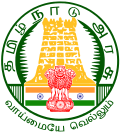| Governor of Tamil Nadu | |
|---|---|
| Tamiḻnāṭu Āḷunar | |
 | |
| Style | His Excellency |
| Status | Head of State |
| Reports to | President of India Government of India |
| Residence |
|
| Appointer | President of India |
| Term length | At the pleasure of the president Renewable |
| Inaugural holder | Krishna Kumarsinhji Bhavsinhji ( Madras State ) Ujjal Singh ( Tamil Nadu ) |
| Formation | 7 September 1948 (as Madras State ) 14 January 1969 (as Tamil Nadu ) |
| Salary | ₹350,000 (US$4,100) (per month) |
| Website | www |

The governor of Tamil Nadu is the head of the Indian state of Tamil Nadu. Governors in India have similar powers and functions at the state level as those of the president of India at the central level. They exist in the state appointed by the president of India and they are not local to the state that they are appointed to govern. The factors based on which the president evaluates the candidates is not mentioned in the constitution. The governor acts as the nominal head whereas the real power lies with the chief minister of the state and their council of ministers.
Contents
- Powers and functions
- List
- Governors of Madras State (1948–1969)
- Governors of Tamil Nadu (1969–present)
- Timeline
- Records
- Oath
- See also
- References
- External links
The current incumbent is R. N. Ravi, who has served since 18 September 2021.






















